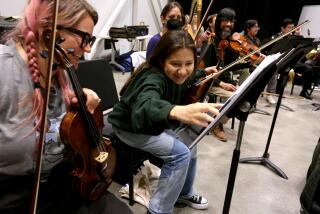Calder Quartet remains unfazed by obstacles
- Share via
Although the Calder Quartet is a young group -- it was formed in 1998 when the members were students at USC, and the players are only 23 and 24 -- it is already facing a major challenge: Pianist Eugenie Ngai, the wife of violist Jonathan Moerschel, is battling cancer.
The group, joined by four guest musicians, dedicated its accomplished and touching performance of Mendelssohn’s evergreen Octet for Strings, which closed a three-part program Monday at the John Anson Ford Amphitheatre, to her.
All evening, the ensemble -- Moerschel, violinists Benjamin Jacobson and Andrew Bulbrook, and cellist Eric Byers -- dealt with obstacles. Two loud helicopters swept over the outdoor venue during the quietest movement (of course) of Beethoven’s third “Rasumovsky” Quartet (Opus 59, No. 3). But the musicians didn’t lose their focus.
Then, Byers’ C string snapped just a few measures into that movement, and the whole group followed him off the stage as he went to repair the damage. When they returned, they resumed their playing without losing a sense of the work’s momentum.
A few audience members laughed good-naturedly when Byers reached the point where the string had broken earlier, and he acknowledged their response with a self-deprecating smile.
The biggest obstacle, however, was the amplification system, which affected tone quality, making it muddied and coarse, and ensemble balance, minimizing inner parts. This made evaluating the performance problematic.
In general, the musicians sounded tentative and cautious. They opened the program with a sweet but withheld account of Haydn’s “Rider” Quartet (Opus 74, No. 3), coming into their own only in the final “galloping” movement.
The “Rasumovsky” Quartet suffered the most. The musicians have the notes -- they’re 2002 Coleman Competition winners, after all -- but not yet the insights necessary to go beyond them and probe the work’s depths. Some say it takes at least a decade for a quartet to begin to reach maturity; these talented players certainly have time on their side.
They were joined by violinists Serena McKinney and Kathryn Eberle, violist Sayaka Kokubo and the highly regarded cellist Ronald Leonard for the Mendelssohn Octet. The damp night air caused pitch problems, strikingly evident in the famed Scherzo, and again, inner parts were often obscured. But the players didn’t fail to make the work cast much of its customary magic.
More to Read
The biggest entertainment stories
Get our big stories about Hollywood, film, television, music, arts, culture and more right in your inbox as soon as they publish.
You may occasionally receive promotional content from the Los Angeles Times.










